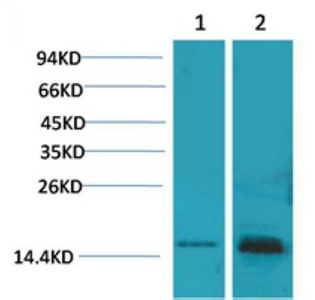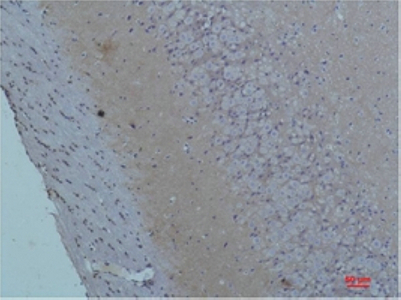S100 Polyclonal Antibody
- Catalog No.:YN5481
- Applications:WB;IHC;IF
- Reactivity:Human;Rat;Mouse
- Target:
- S100
- Gene Name:
- S100A1
- Protein Name:
- Protein S100-A1 (S-100 protein alpha chain) (S-100 protein subunit alpha) (S100 calcium-binding protein A1)
- Human Gene Id:
- 6271
- Human Swiss Prot No:
- P23297
- Mouse Swiss Prot No:
- P56565
- Rat Swiss Prot No:
- P35467
- Immunogen:
- Recombinant Protein of S100
- Specificity:
- The antibody detects endogenous S100 protein
- Formulation:
- Liquid in PBS containing 50% glycerol, 0.5% BSA and 0.02% sodium azide.
- Source:
- Polyclonal, Rabbit,IgG
- Dilution:
- WB 1:500 - 1:2000. IHC 1:100 - 1:300. ELISA: 1:40000.. IF 1:50-200
- Purification:
- The antibody was affinity-purified from rabbit antiserum by affinity-chromatography using epitope-specific immunogen.
- Concentration:
- 1 mg/ml
- Storage Stability:
- -15°C to -25°C/1 year(Do not lower than -25°C)
- Other Name:
- Protein S100-A1 (S-100 protein alpha chain;S-100 protein subunit alpha;S100 calcium-binding protein A1)
- Observed Band(KD):
- 15kD
- Background:
- S100 calcium binding protein A1(S100A1) Homo sapiens The protein encoded by this gene is a member of the S100 family of proteins containing 2 EF-hand calcium-binding motifs. S100 proteins are localized in the cytoplasm and/or nucleus of a wide range of cells, and involved in the regulation of a number of cellular processes such as cell cycle progression and differentiation. S100 genes include at least 13 members which are located as a cluster on chromosome 1q21. This protein may function in stimulation of Ca2+-induced Ca2+ release, inhibition of microtubule assembly, and inhibition of protein kinase C-mediated phosphorylation. Reduced expression of this protein has been implicated in cardiomyopathies. [provided by RefSeq, Jul 2008],
- Function:
- function:Weakly binds calcium but binds zinc very tightly-distinct binding sites with different affinities exist for both ions on each monomer. Physiological concentrations of potassium ion antagonize the binding of both divalent cations, especially affecting high-affinity calcium-binding sites.,similarity:Belongs to the S-100 family.,similarity:Contains 2 EF-hand domains.,subunit:Dimer of either two alpha chains, or two beta chains, or one alpha and one beta chain.,tissue specificity:Highly prevalent in heart. Also found in lesser quantities in skeletal muscle and brain.,
- Subcellular Location:
- Cytoplasm . Sarcoplasmic reticulum . Mitochondrion .
- Expression:
- Highly prevalent in heart (PubMed:12804600, PubMed:1384693). Also found in lesser quantities in skeletal muscle and brain (PubMed:1384693).
Motor neurons transplantation alleviates neurofibrogenesis during chronic degeneration by reversibly regulating Schwann cells epithelial-mesenchymal transition
- June 19-2018
- WESTERN IMMUNOBLOTTING PROTOCOL
- June 19-2018
- IMMUNOHISTOCHEMISTRY-PARAFFIN PROTOCOL
- June 19-2018
- IMMUNOFLUORESCENCE PROTOCOL
- September 08-2020
- FLOW-CYTOMEYRT-PROTOCOL
- May 20-2022
- Cell-Based ELISA│解您多样本WB检测之困扰
- July 13-2018
- CELL-BASED-ELISA-PROTOCOL-FOR-ACETYL-PROTEIN
- July 13-2018
- CELL-BASED-ELISA-PROTOCOL-FOR-PHOSPHO-PROTEIN
- July 13-2018
- Antibody-FAQs
- Products Images

- Western blot analysis of 1) 293T, 2) Mouse Brain Tissue with S100 Rabbit pAb diluted at 1:2,000.

- Immunohistochemical analysis of paraffin-embedded Rat Brain Tissue using S100Rabbit pAb diluted at 1:200.

